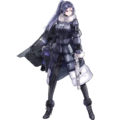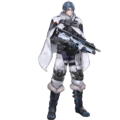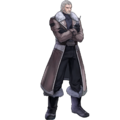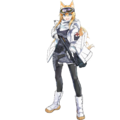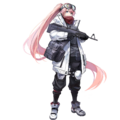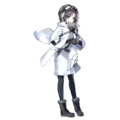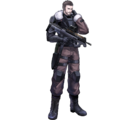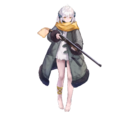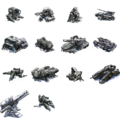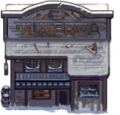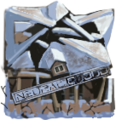Reverse Collapse: Code Name Bakery
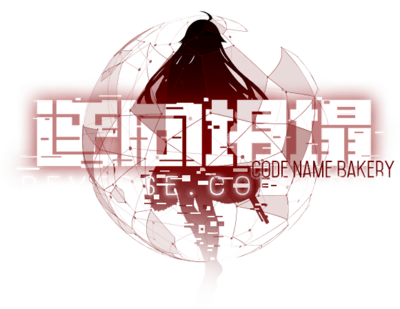
Reverse Collapse: Code Name Bakery (逆向坍塌:面包房行动) is a strategy RPG game for PC developed by MICA Team as a remake of 2013's Codename: Bakery Girl. Originally announced for 2022, it released in all region on 22 March 2024.[1] It is published by X.D. Network Inc. and localized in English, Japanese, Korean, and traditional and simplified Chinese. One of its taglines is “30 years after Girls' Frontline, Code Name Bakery begins.” Mobile and Nintendo Switch versions were announced in the first trailer.
The game features updated graphics and character designs and takes place during the First Antarctic War of 2092, following MID agent Mendo and the mysterious girl Jefuty in their fight against the Union of Rossartrism Nations Coalition armies. The story's script is in excess of 300,000 words[2] and is told through branching timelines due to Jefuty's “ability to recall and challenge her fate”. Some fights use unique animations.[3] Japanese voice acting includes Aya Suzaki, Aoi Yuki, Yui Ishikawa, Katsuyuki Konishi and Hiromu Mineta. The game spans over 60 stages and the estimated playtime to completion is around 100 hours.
Game topics
| Reverse Collapse: Code Name Bakery |
|---|
|
Gameplay
The game supports controllers and mouse-and-keyboard controls and includes a color blind mode. There are three difficulty levels: Casual, with easier battles and no manual save limit (the game provides auto-save); Normal, with only one save per round; and Hard with tougher fights, one save per round and no EXP granted in Training Simulation.
Movement and combat
The game is played on a square grid. After selecting a unit, it can be moved by selecting the target tile, attack by selecting an enemy, or use a skill or equipment, as long as it has enough Action Points (AP) to perform the action. AP is recovered by ending the player's turn. The attack and visual range of an enemy can be previewed by clicking on it, as well as its next movement if it is patrolling. An icon will show if the enemy is on standby (immobile), attacking (moving towards player units), patrolling, defending (switch to attack when a player unit enters attack range) or searching (moving to the last known location of player units after they exit the enemy's visual range). Each attack has a percentage chance to hit and causes flat damage to the target (the game appears to prevent save-scumming to some extent). Some attacks, such as a trip mine explosion, can cause a unit to be thrown prone and lose a turn.
The range of movement of a unit depends on the terrain. Road tiles consume less AP to traverse than rocky or forest terrain. Some tiles, like forests, ruins or sandbags, can give buffs and debuffs to evasion or accuracy. There are also special tiles that restore health or can be targeted to trigger an explosion. Each unit also has a defined firing range depending on its equipped weapon. In attack mode, red tiles denote the most effective range, while the orange tiles at the limit of the range have a lower chance to hit. Each enemy unit defeated grants a Skill Point (SP) to every player unit (with a bonus to the unit that dealt the kill), which can be spent to use a skill. Skills may have a cooldown period after use.
Some tiles on maps are marked to indicate that an item can be picked up. However, there is a limit to the amount of equipment player units can carry. Items exceeding Backpack capacity are stored in the Temporary Backpack and transferred to the Depot at the end of the level. Some items can also be acquired from killing enemies marked with a specific icon.
When all Health Points (HP) of a player unit are depleted, they enter Critical Condition and can no longer take action until another unit use a Medkit on them.
Compounded unit stats (base stats + weapon stats) comprise HP, AP, SP, damage (ATK), accuracy (ACC), attack range (ST), evasion (EVA), critical hit rate (CHR), critical hit damage (CHD), base detection range (NVR) and detection range of stealthy enemies (ASVR).
Stealth
When a character enters stealth mode, they have the opportunity to move unnoticed by enemies. In visual range mode, green tiles are within visual range of an enemy but can be crossed in stealth mode without alerting it, but not yellow tiles. Tiles marked with a crossed eye can always be crossed safely as the enemy's visual range is blocked by terrain. Additionally, tiles vertically and horizontally directly adjacent to a unit, shown striped, are always within detection range. However, enemy units are also able to be concealed from the player's visual range.
Visual range depends on the terrain and mist tiles during extreme weather, which can change during the course of a level. Campfires will expand visual range during extreme weather.
Game phases
Each level begins with a preparation phase where the map layout can be reviewed, characters enhanced and equipment crafted and enhanced.
Each map has a victory objective, several bonus objectives and failure conditions. Bonus objectives count towards the level's final rank, from rank F (not completed) to S. Better ranks grant more EXP and crafting Parts (up to 1.4x multiplier at S rank) as well as Research Points. Extra conditions can become unlocked as the player progresses in the level.
Equipment
See also: Reverse Collapse Items
Equipment includes healing items to restore Health Points, items creating stealth opportunities or debuffing enemies, and attack items such as grenades, mines and turrets. Turret-type items that have been deployed in the field are automatically returned to the Backpack at the end of the level.
Items are stored in the Backpack, which is shared between characters but has limited capacity. Each item type consumes one Backpack space, and there is a limited amount of each item type that can be carried. Backpack capacity increases as players progress in the game. During preparation phase, items can be moved between Backpacks and the Depot, which isn't accessible in combat.
Basic items can be produced by spending Parts during the preparation phase in the Item Production screen. Parts are acquired by completing levels or disassembling items. The stats and carrying capacity of each item type can be increased by spending Research Points in the Item Modification screen during preparation phase. Spending Research Points increases the player's Tech level, which unlocks more modifications.
More powerful items can be created using MID's material shuttle based on Reverse Collapse, in the Item Synthesis screen, by spending basic items and rarer materials. While item production and modification can only be done during preparation phase, Item Synthesis can also be done during combat. Synthesized items cannot be disassembled.
Character Training
EXP points are granted at the end of each level, and benefit all characters at once. The team gains a level when it accumulates enough EXP, which increases the base stats of all characters and grants Potential Keys. The team can be leveled up to the team's level cap during preparation phase using Training Simulation (except in Hard Mode). The level cap is 50.
Passive and active skills for each character, respectively called Traits/Attributes and Skills, can be enhanced in the Genetic Upgrade menu at certain levels by spending Potential Keys. Each time Potential Keys are spent, the Nucleobase Completion rate of the unit's Ultimate Skill increases to unlock up to four upgrades.
While units come equipped with their base weapon, they can acquire alternative weapons with different stats, and each weapon can be Ascended with Modification Blueprints and Parts to raise its stats. Accessories can also be acquired to grant bonuses to a weapon. Weapons can be switched in the field but Accessories must be selected during battle preparation.
Upgrades to skills, items and weapons can be reset and the upgrade currencies and materials refunded by using specific items obtained at the end of some levels: Recombination Keys reset the enhancements of one skill, Restoration Kits reset weapon levels, and Reset Disks reset item researchs.
Game modes
The main story of the game spans 5 chapters. Chapter 4 accounts for most of the levels due to its divergent timeline mechanics.
Once a linear chapter is started on a new game file, it must be played to the end (chapter 4 operates on its own mechanics). After the final level of a chapter is completed, all previous levels can be attempted again in Replay Mode to gather the unique items missed in previous runs. Regular items (orange tiles), including the Parts necessary for crafting, will reappear, but unique items (Secret Documents, collectibles and items from purple tiles including weapon upgrade materials, weapon accessories and item synthesis materials) cannot be farmed. Experience points are also reduced during Replay.
2092R
The original version of Codename: Bakery Girl, called Codename: Bakery Girl 2092R, becomes playable after completing The Final Battle II in Chapter 4. The player must hold the space bar on the main menu until a prompt appears, then enter the second-to last code (Q0Y6-H37X-575I-SVTM) written on the very first Collection item. There are no difficulty options but players should keep in mind that the game was an amateur production at the time and has much rougher gameplay and story. The first playthrough is designated 2092R-1, and the second 2092-R2, with new content.
2092R mode uses completely different saves from the base game. It reuses the graphics and sound design from Reverse Collapse, with the original's map design and story and some of the original music, including the three ending themes and tracks later heard in Girls' Frontline. The main characters receive new non-animated artworks closer to their original designs, usable as costumes in the main game. The ten Secret Documents from the original game can be also be found in their original map locations.
Items exclusive to this mode include the Flash Mine and the UAV Recon Drone. The inventory also works differently, with some items not being stack-able.
The Tactical Chess minigame is also unlocked with 2092R, which is a digital version of the board game sold with preorders of the original game.
-
2092R-1 menu artwork.
-
2092R-2 menu artwork.
Collectibles
Some levels contain a Secret Document, which must be picked up from the indicated tile like a normal item. All levels also contain a Collection item, which must be picked up from an unmarked tile.
Additionally, there are many CGs to be collected by viewing every story scene: 17 in Chapter 1, 29 in Chapter 2, 34 in Chapter 3, 29 in Chapter 4, 36 in Chapter 5, 8 in 2092R and 3 special CGs.
There are also alternative costumes to change the appearance of player units.
Characters
Playable characters
Enemies and NPCs
- Enemies
- NPCs
Merchandising
The game is available in Digital Deluxe Edition on Steam containing:
- Deluxe Edition Upgrade Pack (can be purchased separately)
- A digital artbook (found under steamapps\common\Reverse Collapse Code Name Bakery\artbook). 70 pages at launch, 54 pages added in a later patch.[4]
- Item Bundle, a set of bonus items received once per chapter during preparation phase.
- Seven Antarctic Union Gala Attire character costumes: Evening Gown and Crimson Dress for Jefuty, Evening Suit for Mendo, Standard Coat for Atena, Dinner Suit for Carl, Evening Jacket for Jevon and Secret Gown for Lige.
- Reverse Collapse: Code Name Bakery Soundtrack (can be purchased separately)
The first piece of physical merchandise for the game, announced on release day, is a Jefuty figurine by Reverse Studio.[5]
Development history
A remake of Codename: Bakery Girl was teased during the reveal livestream for Continuum Turbulence in January 2018.[6] In a March 2018 Weibo post, Yuzhong said he would like to include unreleased DLCs in the remake.[7] Two months later, the remake was teased again at the end of Girls' Frontline 2nd Anniversary livestream. The name “Reverse Collapse” was announced in The Art of Girls' Frontline Vol.2.[8] The social media accounts and game pages for Reverse Collapse were put online on 26 July 2019 and the first gameplay trailer was shown during Girl's Frontline 4th Anniversary livestream in 2020. It was announced that the content of three cut DLCs from the original game would be included.[9]
It was originally announced that the plot and character backgrounds would be tweaked from the original game to accommodate the new expanded universe.[10] The project ultimately grew beyond a simple remake and greatly expanded the story and overhauled the level design. A private beta took place in April 2023 to celebrate the 10 years of the original game, followed by a week long public demo during Steam Next Fest on 19 June,[11][12] where it was the 15th most played demo, repeated during the week-long Steam Strategy Fest of 29 August 2023.[2] Many stealth-centric levels received an important update a week after release to make combat approaches possible but difficult.[13]
Yuzhong shared that the remake also served as a possible starter for a new line of Sunborn games, depending on future perspectives.[14]
Differences with Codename: Bakery Girl
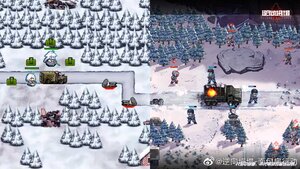
Story and setting
According to the prompt when starting a new game in 2092R mode, the "new version" should be followed when "there is any inconsistency between the plot or setting between the new version and the old version".
Little has been kept from the story of the original game aside from the premise of Jefuty and Lige being high-value targets that Mendo, Carl, Jevon and Atena were tasked with evacuating as part of Operation Bakery, until the ambush where Lige was killed and subsequently recovered by William, and where Jefuty and Mendo met. The dates and the general setting (the snowy mountains with abandoned villages, the cliff overlooking a URNC base, the ELIDs in the contamination zone) were kept, but some specifics were changed such as the setting moving from Ukraine to the Caucasus. The biggest additions are Jefuty's ability to send her memories back in time, expanding on her connection with Relic Technology, and the Shrike, which modifies Lige's role in the story.
Mendo's amnesia was scrapped and Jevon and Atena's roles greatly expanded, while Carl's story retains one element from the original, where he also survived the ambush without Mendo's knowledge and was surveying the URNC base before the rest of the cast met him there. The development of the relationship between Jefuty and Mendo was kept (albeit with a new context due to the repeating timelines), with Jefuty progressively becoming less prickly towards Mendo as he demonstrates his skills and moral values. Their situations at the end of the story are similar to the original. A scene where Mendo decides to help the refugees when Jefuty wanted to abandon them to their fate was kept. Lige retains her changes in appearance and speech pattern as she is transformed from a civilian kid to a brainwashed fighter.
Beria's role is very different as he was simply a double-agent in the original, but has a less clear-cut allegiance in the remake due to his new motivations tied to the Shrikes. William's appearance is much younger in the remake than in the original, and his role more central, while in the original his name never appeared in the script, and his identity was only learned from matching clues in the story with the materials in the Secret Documents. Mendo's connection to Jefuty through his father was similarly cryptic but became central in the plot of the remake. Sugar, Oleg and the Werewolves were introduced as part of the Shrike plotline while replacing the generic "Special Forces" soldiers from the original. The refugee characters seen in Chapter 2 are expanded from the anonymous playable units in the second level of the original. The Dolls from the Rescue Foundation are new additions to better tie the game to the larger Girls' Frontline universe, like other concepts such as the Virtual Consciousness Image. The Secret Documents contain many new details pertaining to the plot of the Girls' Frontline mobile game.
The map from the second-to-last level of the original game was adapted in Chapter 4, "Dead End" of the remake, with enemies pouring in from all sides around a village with a bell tower used as a sniping nest by Jefuty.
Gameplay
Systems kept from the original include movements, aiming, stealth, preparation phase, item synthesis before and during combat (item production was only available with Atena present), weapon enhancement and weapon accessories (Mendo only). Only Mendo and Jefuty gain experience and can be enhanced in the original, this amount was increased to 6 characters in the remake. Characters only have one non-upgradeable skill in the original, which is their Ultimate Skill in the remake. The animated cut-in of ultimate skills in the remake are inspired by the simple cut-ins from the original. In the remake, stats increase with the team level and enhancement currency is spent on the skills, while they are expended to enhance HP, AP, accuracy, evasion and visual/anti-stealth range up to 5 times in the original (gaining a level also enhances HP, accuracy and evasion). The remake only accounts for optimal accuracy and suboptimal accuracy for weapons, while the original also had a third “normal accuracy” stat.
Item research was introduced by the remake, along with many new items and skills, and the ability to upgrade the ultimate skill. Equipment-type items are lost if destroyed in the original, leading to an abundance of their crafting materials unlike in the remake. Weapon enhancement also requires special blueprints in the remake, while it only consumes parts in the original. However, parts ware also rarer in the original, making it more important to recover resources on the maps. The representation of items and secret documents as green and yellow bags in the Battlefield Information map in the remake is a reference to the representation of these items on the maps in the original game. The adaptive music changing depending on the detection status of the player units is more noticeable in the original.
In the original game, the final score of a mission, as well as the amount of experience and parts received, was compounded from three sub-scores: the number of turns taken, the number of units that entered critical condition, and the number of "Soldier", "Special", "Vehicle" and "Boss" enemy units killed. The remake introduced bonus objectives, which are the only determiners for the final score.
Gallery
-
Logos.
-
Game icon.
-
Main key art.
-
Non-final version.
-
Main menu artwork (static).
-
Main menu artwork after certain story chapters.
-
Promo CGs.
-
New enemy character: Sugar.
-
Girls' Frontline login wallpaper during April Fools 2023.
-
Teaser concepts shown during Girls' Frontline 2nd Anniversary livestream in 2018.
Easter Eggs
- See also: Reverse Collapse Collection
-
Various wreckage of Girls' Frontline enemy vehicles found in most levels.
-
Artist:音符's mascot in abandoned vehicle found in some levels.
-
The “Athena's Owl” (Minerva) bar.
-
Project Neural Cloud storefront.
Links
- Official Weibo account
- Steam page
- First Trailer
- Gameplay trailer
- Second Trailer
- Final Trailer
- Official English Twitter account
References
- ↑ Final release announcement
- ↑ 2.0 2.1 Steam announcement
- ↑ Steam page announcement
- ↑ Apr. 12nd Patch Note
- ↑ Bilibili
- ↑ Weibo post
- ↑ The Art of Girls' Frontline Vol.2, p.399
- ↑ 4th Anni Announcements
- ↑ Girls' Frontline Carnival 2021
- ↑ Steam announcement
- ↑ Steam playtest announcement
- ↑ Steam - 03-29 RC patch note
- ↑ Youxiputao interview
| Franchise |
|---|










